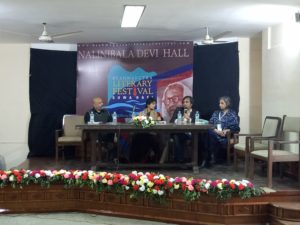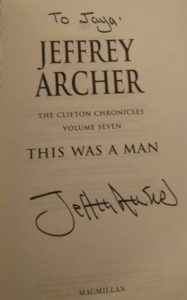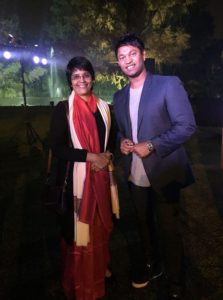Of debut novels
2019 is proving to be a year of debut writing. Perhaps it is also an indication of the disruption that digital technology has made of print publishing. It is becoming more and more expensive to publish and if the advance against royalties is also included for publishing established names, then the unit cost of printing a book escalates. Perhaps this is one of the reasons why 2019 has been the year of debuts. Presumably publishers feel that the ROI on a debut author can be easily absorbed in their P/L sheets. Who knows?! Fact is, extraordinary amounts of literature across the globe by debut writers has been published in the past year. Some of it is stupendous. Three worth highlighting in this blog post are: Varun Thomas Mathew’s The Black Dwarves of the Good Little Bay , Nana Oforiatta Ayim’s The God Child and Rehana Munir’s Paper Moon. Three very distinct voices. Three distinct stories. All three debut writers who will shine in the future.
Varun Thomas Mathew is a lawyer by profession but has written a dystopic novel set in the near future where all humanity in India seems to be concentrated in a towering structure called Bombadrome. It is inhabited by people who have no memory and hence no sense of history. They have no recollection if this place was once called Bom Bahia or Bombay or Mumbai. It is a colony where there are specific functions allocated to each section. Occupiers of each section are identified by their uniform. Every task, evey person has a specific role that is designated by the powers that be and there seems to be no existence of free will. It is a “memoir” being written by a former bureaucrat called Convent Godse. The Black Dwarves are manual scavengers who resorted to splashing buckets of filth on to walls to create “arresting art”. Thus capturing the imagination of the media. But the black dwarves are like multiple versions of the real-life Banksy. Despite the Police Commissioner claiming to have arrested the Black Dwarves, a movement arose that could not be ignored. Like this there are many instances in the immediate past that Convent Godse has witnessed and finally opts to write them down. Another one is of the flautist who would stand at the Gateway of India playing tunes that “made passers-by of different religions fall in love” — love jihad. Convent Godse seems to retain a sense of perspective and sanity as he chooses to stay outside the boundary walls of Bombadrome. One of the people incarcerated in the medical quadrant who is a witness to the current chief minister’s past atrocities and the day the politician gains power, the witness “loses his mind” and is taken away. This is a sharply told tale that despite being set in the near future is horribly close to present realities. It is a powerful debut for sometimes fiction thinly masks the truth. Read it. Perhaps one day Man Booker Prize winner Paul Beatty and Varun Thomas Mathew can be encouraged to have a heart to heart talk about the literature they make and what propels them to write these extraordinary stories.
Nana Oforiatta Ayim is a Ghanaian writer, art historian and filmmaker whose debut novel is The God Child. It is about Ghanian expatriate Maya who is brought up in Germany and England. Later she is joined by her cousin from her mother’s side, Kojo. Maya’s mother belongs to a Ghanian royal family and is fairly regal in her ways. The children are close. So when Kojo is bullied, Maya is a witness and his confidante. Later as an adult she visits Kojo in Accra where he is trying to put together a museum that will revive their past royal glory. He is working very hard to put it together but tragedy strikes. Once again, Maya is a mute witness to a dream shattering. As with most debut novels, there is always a strong autobiographical element. The God Child is no different with Kojo’s drive to establish a museum in Accra is closely aligned to Ayim’s project of establishing an open-source encyclopedia of African history. Ayim’s fascination with art history resulted in her being the curator of the African pavilion at this year’s Venice Biennale. As with the link to the lecture posted below, Ayim’s debut novel is preoccupied with the different ways of seeing. The protagonist of the novel is equally at ease in Germany, England and Ghana but Maya is constantly made to feel an outsider. The insidious racism that exists in society is horrendous. Kojo and she bear the brunt of it. Ayim has an unabashed critical filmmaker’s lens to talk about society across three lands — Germany, UK and Ghana. The clash of cultures and the insidious and deep seated racism which continues to persist in the poshest of places. Also the complete unacceptance of these so-called developed nations to accept the stories of children from Ghana, simply because they are black and speak of being descendants of kings and living in palaces. It is to the white world a myth that the blacks weave. The writer shares unpleasant truths which will not go down well in the polite world which speaks constantly of diversity and inclusivity but when it comes to practice what they preach is unable to truly accept wholeheartedly how difficult it is to embrace differences. I also like the surety with which the author writes in three languages — English, German and the African dialect, Twi, without necessarily explaining it immediately or contextualising it. It is much like the French used by Wodehouse in his novels. You either know it or don’t, so most readers learned to skip those passages and yet enjoyed the storytelling. Same here. As she says in this TED Talk that she has the power to define her own narrative — “We deserve to be in this place“. It shows a calm and confident writer who has been dissed in the early reviews for writing a “promising but uneven novel” — which it is not. Far from it. Read it for yourself. Unsurprisingly, Ayim has dedicated her novel to John Berger.
The last debut novel under discussion is Rehana Munir’s fabulous Paper Moon. It is about Fiza inheritance from her absent father stipulating that she run a bookstore. Well, she is left a lump sum of money to do whatever she likes but he would love it if she made his dream of running a bookshop come true. This is an idea that she too has been secretly nursing but once the possibilities exist she quickly swings into action. Practically overnight from a quiet, good college girl who listens to whatever her mother, an ex-Jazz singer has to say, Fiza becomes a businesswoman. She sets up a bookshop in a old Bandra mansion. It is named after the popular Jazz song, “It’s Only a Paper Moon“. It is an enterprise that is thrilling, allows for a variety of visitors to troop in, it is a peek into the bookselling trade and getting books on consignment from the distributors etc. More than that it gives her the opportunity to introspect her own life, her relationships with her ex-boyfriend, Dhruv and the mysterious stranger who frequents her store, to the wide network ( safety net) of well-wishers. Paper Moon is written in a beautifully restrained manner making it hard to believe that this is a debut voice. The characters are so well etched. The plot moves at a controlled pace. There seem to be no awkward edges in the storytelling or clunky pieces in the plot. What is truly refreshing is the confidence with which Rehana Munir presents life in Mumbai and Goa for what it is — with its diversity, the ease with which everyone is comfortable with each other’s beliefs and practices. There are no apologies or fear presented. It is normal life. This despite her belonging to a generation that may have not witnessed the World Wars or the horrific aftermath of Indian Independence — the communal riots which accompanied the partition of the subcontinent. But while “contemplating the post 9/11 world… . Babri Masjid happened, dividing Fiza’s city forever. Not there was the gore and gloom of Gujarat. Every generation thought of itself as unique. Of negotiating historical events without precedent or the possibility of recurrence. Yet, how was this rapid descent into madness any different from the countless ones that had previously occurred?” This is the undercurrent affecting everyone and yet life carries on. Surprisingly Rehana Munir’s narrative, albeit fiction, affirms that if we see around us, life is different to what is told to us in hegemonic discourses which are increasingly being controlled by politicians. Much like what Hans Rosling laid out in Factfulness. Both are equally hopeful books in an otherwise depressingly dystopic age. Rehana Munir’s Paper Moon is a story that deserves to be converted to film without compromising on the story at all in the screen adapatation. It must run as is. Paper Moon leaves such a happy space in one’s mind of hope and joy for the future. And it is not a book I would classify as Up lit. It is good old-fashioned storytelling. Share it widely. Give it the love it deserves. Gift it happily.
7 December 2019



